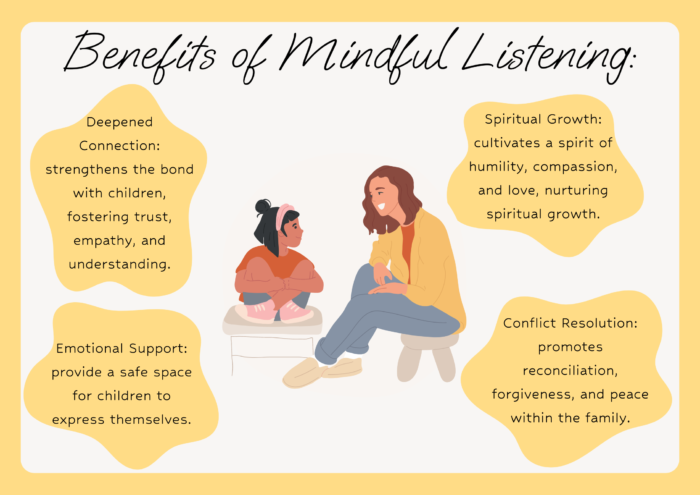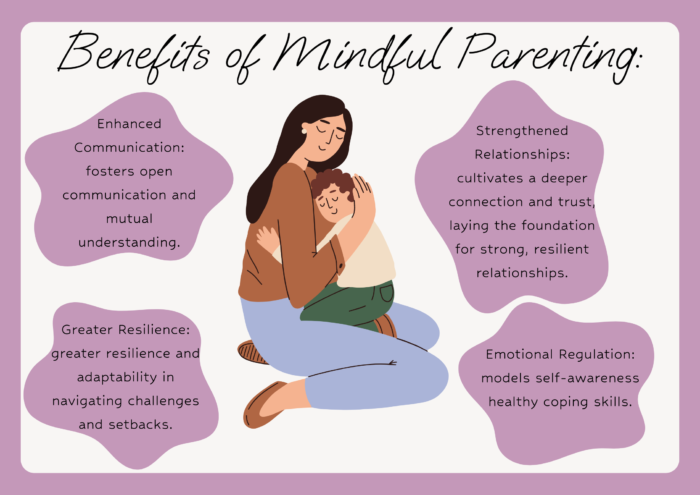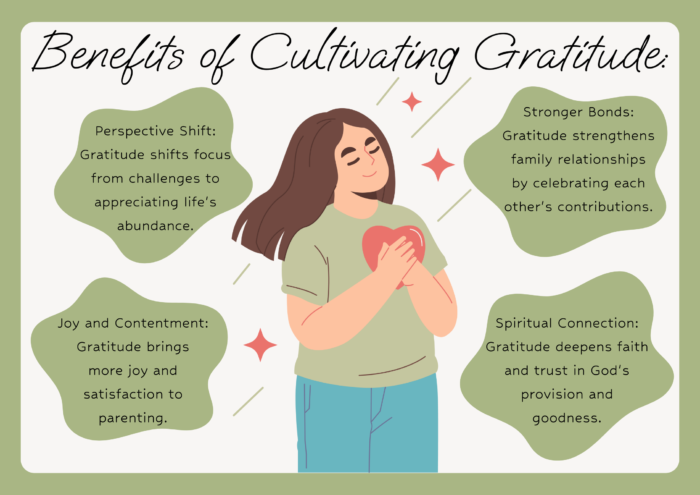Nurturing Calm: 6 Tested Mindfulness Techniques for frantic Moms

As mamas, we all face tough moments like tantrums, lack of sleep, or a jam-packed schedule. It’s natural to feel overwhelmed and stressed out in those situations. But we do not have to stay overwhelmed and stressed out! As Christians, we have an incredible tool – mindfulness techniques rooted in our faith. These practices can help us find strength and comfort during challenging parenting moments.
Mindfulness, in the context of our Christian faith, involves being present in the moment and focusing on God’s presence and guidance in our lives. It’s not about emptying our minds or detaching from our emotions, but about being fully aware of God’s love and grace in every situation. By being aware of the present moment, acknowledging God’s sovereignty, and surrendering our worries and fears to Him, we can experience the peace that surpasses all understanding, as Paul wrote in Philippians 4:6-7.
Incorporating mindfulness practices into our daily lives can help us cultivate a deeper sense of peace and trust in God’s plan, making us better equipped to handle the stresses of parenting. So, let’s explore mindfulness techniques from a Christian perspective that can help you stay grounded in your faith, present in the moment, and better equipped to handle the challenges of raising children. I’m excited to share these strategies with you and help you transform how you approach parenting.
Disclaimer:
This blog post contains affiliate links. This means that I may earn a commission if you click on the link and make a purchase, at no additional cost to you. Please note that I only recommend products or services that I genuinely believe in and that align with the content and values of my blog. Your support through these affiliate links helps me maintain and improve the quality of my content. Thank you for your support!
Scripture Meditation:
Scripture meditation is more than just reading or memorizing verses; it’s about diving deeply into the richness of God’s Word, allowing it to penetrate our souls and transform our lives. Just as a precious jewel reveals new facets of its beauty when examined closely, Scripture meditation unveils deeper layers of God’s truth as we reflect on its meaning and relevance to our lives.
In this sacred practice, believers enter into a profound dialogue with God, listening attentively to His voice as it speaks through the pages of Scripture. It’s a beautiful dance of intimacy and revelation, where His Word illuminates our hearts and minds, guiding us into a deeper understanding of His love and wisdom.
As we meditate on Scripture, we allow God’s truth to permeate every aspect of our being, shaping our thoughts, attitudes, and actions. It’s like planting seeds of faith in the fertile soil of our hearts, allowing them to grow and bear fruit in our lives.
Through Scripture meditation, we embark on a transformative journey that leads us to peace, insight, and a deeper connection with God. It’s a pathway illuminated by the light of His Word and supported by centuries of Christian tradition, reminding us that we are not alone on this journey but surrounded by a cloud of witnesses who have gone before us.
How to Practice Scripture Meditation:
To practice scripture meditation, individuals should choose a passage that speaks to their current circumstances and resonates with their heart. The selected passage should be read slowly and attentively, allowing each word to sink deeply into the soul. As you read, reflect on the meaning and significance of the verses, and how they apply to your life and the challenges you face as a parent. This is not just about intellectual understanding, but about allowing God’s Word to transform your thoughts, attitudes, and actions. Finally, quiet your heart and mind, and listen for God’s guidance and direction as you seek to live out His Word in your daily life.
Rooted in Scripture:
The Bible contains wonderful messages encouraging us to meditate on God’s Word. It highlights the importance of Scripture in shaping our lives and bringing us closer to Him. Joshua 1:8, for instance, urges us to keep the Book of the Law close to our hearts and meditate on it day and night. This is not just about intellectual study, but about allowing God’s Word to permeate our hearts and minds, transforming our thoughts, attitudes, and actions. It’s a beautiful reminder that through continuous meditation on Scripture, we gain a better understanding and the wisdom and strength to live according to God’s will.
Similarly, Psalm 1:2-3 paints a lovely picture of the blessings that come to those who delight in God’s law and meditate on it day and night. Just like a tree planted by streams of water flourishes and bears fruit in due season, we too can become like trees firmly rooted in the soil of His truth, drawing sustenance and strength from His presence. Practicing meditation allows His Word to take root in our hearts, transforming us from the inside out. Our lives become testimonies to His goodness and faithfulness.
Benefits of Scripture Meditation:
- Spiritual Nourishment: Scripture meditation nourishes the soul, providing spiritual sustenance and deepening one’s relationship with God.
- Wisdom and Insight: Through scripture meditation, believers gain knowledge, insight, and discernment for navigating the complexities of parenting and family life.
- Peace and Comfort: Scripture meditation brings comfort and assurance, reminding believers of God’s faithfulness, presence, and love in every season of life.
- Transformation: As believers meditate on God’s Word, they are transformed from the inside out, becoming more Christlike in their character and conduct.

Mindful Breathing:
Mindful breathing is like a gift from above. It is a beautiful practice that invites us to experience the peace and presence of God in every moment. Just as we are called to be still and know He is God, mindful breathing lets us quiet our minds and tune into His loving presence. This is not about emptying our minds or detaching from our emotions, but about being fully aware of God’s love and grace in every breath we take.
With each breath, we can slow down and feel God’s grace and love flow through us. It’s a simple yet profound way to center ourselves in His peace, letting go of worries and fears as we trust Him. This is not just about managing stress, but about deepening our relationship with God and finding joy in the present moment. It’s a reminder that we are not alone in our struggles, but that God is with us, breathing life into every moment.
As we practice mindful breathing with non-judgmental awareness, we cultivate a gentle spirit within ourselves, mirroring God’s compassion and understanding for us. It’s a reminder to be kind to ourselves and others, knowing that we are all beloved children of God.
How to Practice Mindful Breathing:
To practice mindful breathing, find a comfortable position with a straight back and gently rest your hands on your lap or thighs. If you feel comfortable, gently close your eyes to minimize distractions and redirect your focus inward. You can do this while waiting for your child to finish their meal, during a quiet moment before bed, or even in the midst of a chaotic day. Focus on the sensation of your breath as it enters and exits your body. Breathe slowly and deeply through your nose, allowing your lungs to fill with air, followed by a slow and thorough exhale to release any tension or stress. In this sacred moment of mindful breathing, allow yourself to be fully present with God, letting His love surround and fill you. Know that in His presence, there is comfort, strength, and renewal for your soul.
Rooted in Scripture:
In Psalm 46:10, we’re reminded to “Be still, and know that I am God.” This powerful verse speaks directly to the essence of mindfulness, encouraging us to cultivate a sense of stillness and presence in our lives. It’s a gentle invitation to quiet the noise of the world around us and tune into the loving presence of God within our hearts.
Similarly, Isaiah 26:3 reassures us: “You will keep in perfect peace those whose minds are steadfast because they trust in you.” This verse beautifully captures the profound connection between trust in God and inner peace. When we anchor our minds in steadfast faith, we open ourselves to the peace that surpasses all understanding and can sustain us through life’s trials and tribulations.
By practicing mindful breathing, we align ourselves with these timeless truths, allowing us to be fully present with God in each moment. As we breathe in His love and exhale our worries, we deepen our trust in His providence and experience the profound peace that only He can give.

Benefits of Mindful Breathing:
- Stress relief: Mindful breathing helps calm the nervous system, reduces stress hormones, and promotes relaxation.
- Increased presence: By focusing on the breath, mindful breathing helps bring our attention fully to the present moment, fostering greater presence and awareness.
- Emotional regulation: Mindful breathing can help regulate emotions, allowing us to respond to challenges with greater clarity and calmness.
- Spiritual growth: Mindful breathing allows spiritual reflection and connection with God, deepening our faith and trust in His providence.
Grounding Techniques:
Grounding techniques are like gentle reminders from God, guiding us back to a place of peace and stability amidst life’s storms. These techniques are a collection of coping strategies lovingly designed to help us navigate overwhelming emotions, anxiety, or moments of dissociation by reconnecting us with the present moment.
With grounding techniques, we’re encouraged to shift our focus away from the whirlwind of distressing thoughts and emotions. Instead, we redirect our attention to the here and now—our immediate environment and physical sensations.
One such method, the 5-4-3-2-1 technique, is like a gentle embrace from God, inviting us to engage our senses and find solace in His presence. By naming five things we can see, four things we can touch, three things we can hear, two things we can smell, and one thing we can taste, we create a tangible anchor for our thoughts and emotions. In this way, we can experience a sense of centeredness, calmness, and control, knowing that God is with us every step.
How to Practice the 5-4-3-2-1 Grounding Technique:
Five Things You Can See: Take a moment to look around and spot five objects nearby. It could be anything from the cozy blanket on your couch to the beautiful flowers outside your window. Each object has its own story, so take your time to notice and appreciate them.
Four Things You Can Touch: Shift your attention to your sense of touch and discover four things you can feel around you. Feel the warmth of the sunlight on your skin, your favorite sweater’s softness, or a tabletop’s smooth texture. Let each sensation ground you in the present moment.
Three Things You Can Hear: Listen closely to your surroundings and identify three distinct sounds. Maybe you hear the gentle rustle of leaves in the breeze, the distant chirping of birds, or the comforting hum of household appliances. Each sound adds its own melody to the symphony of life.
Two Things You Can Smell: Engage your sense of smell by noticing two scents nearby. Take a deep breath and enjoy the aroma of freshly brewed coffee or the crisp scent of a rainy day. Let each scent awaken your senses and fill you with gratitude for the simple joys of life.
One Thing You Can Taste: Finally, focus on your sense of taste and identify one flavor you can taste or imagine. Whether it’s the sweetness of a ripe piece of fruit or the savory goodness of your favorite snack, let the taste linger on your tongue and bring a smile to your face.
Rooted in Scripture:
Grounding techniques are like a gentle embrace from Scripture, echoing its timeless wisdom and urging believers to be firmly rooted in faith and God’s presence. Just as a tree’s roots anchor it to the earth, grounding techniques anchor us in the present moment, fostering a deeper connection with God.
Colossians 2:7 paints a beautiful picture of this spiritual anchoring, encouraging us to let our roots grow deep into Him, like a tree drawing nourishment from the soil. As we build our lives on the foundation of God’s truth, our faith grows strong, and we overflow with thankfulness for His abundant blessings. It’s like finding our stability in the midst of life’s storms, knowing that we are deeply rooted in God’s love and care.
Similarly, Psalm 34:8 invites us to taste and see the goodness of the Lord, like savoring the sweetness of a ripe fruit. It’s an invitation to take refuge in His presence, finding comfort and strength in His embrace. Just as grounding techniques engage our senses to anchor us in the present moment, tasting and seeing the goodness of the Lord allows us to experience His love and provision in tangible ways.
Benefits of Grounding Techniques:
- Stress relief: Grounding techniques provide immediate relief from stress and anxiety, offering a sense of calmness and relaxation.
- Improved focus: By anchoring individuals in the present moment, grounding techniques enhance focus and concentration, promoting productivity and clarity of mind.
- Emotional regulation: Grounding techniques help individuals manage and regulate their emotions more effectively, enabling them to respond to challenges with greater resilience and composure.
- Spiritual connection: Through grounding techniques, individuals deepen their spiritual connection with God, finding strength, peace, and gratitude in His unwavering love and presence.

Mindful Listening:
Imagine mindful listening as a beautiful dance of love and understanding, where our hearts are open, and our minds are quiet, allowing us to truly hear the words spoken by others. In the realm of parenting, it becomes a sacred practice—a gift we offer our children each day.
Mindful listening in parenting invites us to pause amidst the busyness of our days, to carve out moments where we give our children the precious gift of our undivided attention. It’s about more than just hearing their words; it’s about genuinely listening to their hopes, fears, joys, and sorrows with a heart full of love and understanding.
In these moments of mindful listening, we embody the essence of prayerful presence, engaging with our children in a spirit of humility, compassion, and love. It’s a beautiful expression of our trust in God’s presence in our relationships as parents, knowing He is at work in the tender exchanges we share with our children.
How to Practice Mindful Listening:
- Create Space: Make it a point to carve out a special time each day to engage in mindful listening with your children. Choose a quiet moment, free from distractions, where you can give them your full attention.
- Be Present: Approach each interaction with your children with an open heart and a calm mind. Focus completely on what they’re saying, tuning in to their words and emotions without any distractions.
- Listen Without Judgment: Practice active listening by creating a safe space for your children to express themselves openly. Let them know their thoughts and feelings are valued, and they can share without fear of judgment or criticism.
- Offer Silent Prayers: As you engage with your children, silently lift up prayers for wisdom, patience, and love. Invite God’s presence into your interactions, trusting in His guidance and grace to navigate the moments together.
- Reflect and Respond: After listening attentively to your children, take a moment to reflect on what they’ve shared. Respond with empathy, validation, and encouragement, showing them that you genuinely understand and care about their feelings.
Rooted in Scripture:
Mindful listening is not just a modern practice; it’s deeply rooted in the wisdom of Scripture, where we find guidance on how to listen with love and attentiveness. The Bible reminds us of the importance of mindful listening in our interactions with others.
In James 1:19, we’re encouraged to be quick to listen, slow to speak, and slow to become angry—a gentle reminder of the power of attentive listening in fostering understanding and harmony. It’s like God whispering to our hearts, urging us to approach every conversation with humility and compassion, ready to receive the words of others with an open heart.
Similarly, Proverbs 18:13 teaches us the folly of rushing to respond without first listening. It’s a wise counsel that echoes through the ages, reminding us that true wisdom begins with listening—a willingness to pause and truly hear the thoughts and feelings of others before offering our own perspective.

Benefits of Mindful Listening:
- Deepened Connection: Mindful listening strengthens the bond between parents and children, fostering trust, empathy, and understanding.
- Emotional Support: By genuinely listening to their children’s thoughts and feelings, parents provide a safe space for them to express themselves and receive emotional support.
- Spiritual Growth: Mindful listening cultivates a spirit of humility, compassion, and love, nurturing spiritual growth and deepening our relationship with God.
- Conflict Resolution: By practicing mindful listening, parents can navigate conflicts with their children more effectively, promoting reconciliation, forgiveness, and peace within the family.
Mindful Parenting:
Mindful parenting is like weaving a tapestry of love and grace into the fabric of everyday life with our children. It’s about being fully present and attuned to their needs, even in the midst of life’s busyness. This beautiful practice invites us to approach parenting with intentionality, empathy, and a deep sense of connection.
As followers of Christ, mindful parenting becomes an expression of our faith in action. It’s about embodying the values of love and compassion that Jesus taught us, even in the smallest moments of our daily interactions with our children.
In the chaos of parenthood, mindful parenting encourages us to pause before reacting impulsively out of frustration or anger. Instead, we’re invited to consciously choose how we respond, drawing from the well of love, empathy, and understanding that God has poured into our hearts.
By tuning into our children’s emotions and needs, we nurture a deeper connection and cultivate empathy and mutual respect in our relationships. It’s about seeing our children through the lens of God’s love, cherishing them as precious gifts, and guiding them with grace and wisdom as they navigate the world.
How to Practice Mindful Parenting:
- Pause and Breathe: Whenever you face a tough moment with your child, remember to take a deep breath. Let it ground you and bring you back to the moment of clarity and calm.
- Reflect on Intentions: Before you say or do anything, pause and reflect on your intentions. Ask yourself how you want to be there for your child and what you hope to achieve in that moment.
- Tune into Your Child: Pay attention to your child’s feelings and cues, even the ones they don’t express verbally. Take the time to understand their perspective and what they might need from you.
- Respond with Empathy: When you interact with your child, do so with empathy and understanding. Let them know that you hear them and that their feelings are valid. Offer comfort and support whenever they need it.
- Cultivate Connection: Spend quality time together to foster a strong bond with your child. Engage in activities you enjoy and have meaningful conversations that deepen your bond. Remember, these moments build a lifetime of love and trust between you and your child.
Rooted in Scripture:
Colossians 3:21 serves as a gentle reminder of the profound impact parents have on their children’s lives. It emphasizes the power of words and actions in shaping the hearts and minds of children. This verse highlights the importance of speaking and acting with kindness and compassion by urging parents to refrain from provocation and bitterness. It underscores the notion that our words and actions carry significant weight, capable of either uplifting or discouraging our children. Thus, by embodying love and understanding in our interactions, we create a nurturing environment where our children can thrive and flourish.
Similarly, Ephesians 6:4 encourages parents to approach their role with intentionality, emphasizing the importance of grounding parenting practices in the training and instruction of the Lord. This verse underscores the significance of nurturing a relationship with our children that is rooted in love, respect, and spiritual guidance. Through gentle guidance and loving discipline, parents help their children develop a strong foundation of faith and values that will guide their lives.
Benefits of Mindful Parenting:
- Enhanced Communication: Mindful parenting fosters open communication and mutual understanding between parents and children, strengthening the parent-child bond.
- Emotional Regulation: By modeling emotional regulation and self-awareness, mindful parenting helps children learn healthy coping skills and navigate their emotions more effectively.
- Strengthened Relationships: Mindful parenting cultivates a deeper connection and trust between parents and children, laying the foundation for strong, resilient relationships.
- Greater Resilience: By approaching parenting with mindfulness, parents develop greater resilience and adaptability in navigating challenges and setbacks, both individually and as a family.

Cultivating Gratitude:
Cultivating gratitude is like having a heart-to-heart conversation with God, where we intentionally pause to recognize and cherish the blessings He has bestowed upon us, especially in the beautiful journey of parenthood. It’s about carving out special moments each day to reflect on His goodness and provision, counting our blessings, and keeping a gratitude journal to document the precious moments that we’re thankful for.
By nurturing an attitude of gratitude, we shift our perspective from focusing solely on challenges to embracing the abundance of blessings surrounding us. This shift fosters a deep sense of joy, contentment, and trust in God’s unwavering faithfulness, even amidst life’s ups and downs.
Through gratitude, we cultivate a heart overflowing with thankfulness, acknowledging God’s presence in every aspect of our lives, including the joys and trials of parenting. It’s a beautiful journey of discovery and appreciation, where we learn to see God’s fingerprints in the smallest details and find comfort in His steadfast love and care.
How to Cultivate Gratitude:
- Daily Reflection: Take a few moments each day to reflect on the blessings you’ve experienced as a parent, no matter how big or small. It could be a heartwarming hug from your child, a peaceful moment of bedtime storytelling, or even a sunny day spent together outdoors.
- Keep a Gratitude Journal: Start a journal to jot down three things you’re grateful for each day. Whether it’s the delicious smell of homemade cookies baking in the oven, the sound of laughter filling your home, or the warmth of your family’s love, capture these moments of gratitude to revisit and cherish later.
- Offer Thankful Prayers: Take time to thank God in prayer for His countless blessings in your life and the lives of your children. Express gratitude for His provision, protection, and loving presence, knowing that He walks with you every step of the way on this parenting journey.
- Share Gratitude with Your Family: Encourage your family to join you in practicing gratitude by sharing what they’re thankful for during meal times or family gatherings. Create a space where everyone can express gratitude and appreciation for the blessings they’ve experienced, fostering a culture of thankfulness and joy within your home.
Rooted in Scripture:
Scripture abundantly supports this practice, urging believers to give thanks in all circumstances, whether in times of joy or trials. Psalm 107:1 sings with exuberance, inviting us to join in the chorus of gratitude: “Give thanks to the Lord, for he is good; his love endures forever.” This verse reminds us of God’s unwavering goodness and His everlasting love surrounding us like a warm embrace, no matter our challenges.
Similarly, 1 Thessalonians 5:18 shines like a beacon of light, guiding us to “give thanks in all circumstances; for this is God’s will for you in Christ Jesus.” It’s a gentle reminder that gratitude isn’t just a fleeting emotion—it’s a deliberate choice rooted in our faith and trust in God’s sovereignty.
In cultivating gratitude through the lens of Scripture, we align our hearts with God’s will, acknowledging His goodness and faithfulness in every aspect of our lives. As we give thanks, we draw closer to Him, finding peace, joy, and contentment in His loving presence.

Benefits of Cultivating Gratitude:
- Shift in Perspective: Gratitude helps shift our perspective from focusing on challenges and difficulties to recognizing and appreciating the abundance of blessings in our lives.
- Increased Joy and Contentment: By cultivating an attitude of gratitude, parents experience increased feelings of joy, contentment, and satisfaction in their role as parents.
- Strengthened Relationships: Expressing gratitude fosters deeper connections and strengthens relationships within the family as parents and children learn to appreciate and celebrate each other’s contributions and qualities.
- Spiritual Growth: Gratitude deepens our relationship with God, fostering trust, faith, and reliance on His provision and goodness in all aspects of our lives.
Conclusion:
Parenthood is a journey filled with both joys and challenges, but with mindfulness practices rooted in our faith, we can navigate it with grace and resilience. By embracing mindfulness, we discover practical ways to find peace and strength in God’s presence, transforming stressful moments into opportunities for growth and connection with our children.
As we weave mindfulness into our daily lives through Scripture meditation, mindful breathing, grounding techniques, mindful listening, and gratitude practice, we deepen our bond with God and our children. These practices remind us of the profound impact of our words and actions on our children’s hearts and the importance of nurturing relationships built on love and spiritual guidance.
By embracing mindful parenting, we lead with love, grace, and faith, creating a nurturing environment where our children can thrive. Together, let’s embark on this journey of mindful parenting, knowing that with God’s presence and the support of mindful practices, we can find joy, peace, and fulfillment in our roles as mothers.

- Reflect on a recent challenging parenting moment you faced, such as dealing with tantrums, sleep deprivation, or a busy schedule. How did you feel in that moment, and how did you respond to the stress and overwhelm?
- Explore a Scripture passage mentioned in the blog post that resonated with you. How does this passage speak to you as a parent, and how can you apply its wisdom to your daily life and interactions with your children?
- Think about ways you can integrate these mindfulness practices more intentionally into your parenting journey. Are there specific areas of your life or routines where you would like to prioritize mindfulness and spiritual growth? What steps can you take to cultivate a deeper sense of peace, trust, and presence in your daily life as a parent?
- Imagine yourself a year from now, having embraced mindful parenting practices and deepened your connection with your children and with God. What does this future version of yourself look like, and what positive changes do you envision in your family dynamic as a result of your mindful parenting journey?

Books:
- “Mindfulness: An Eight-Week Plan for Finding Peace in a Frantic World” by Mark Williams and Danny Penman
- This book offers an eight-week mindfulness program designed to help readers find peace and tranquility amidst the busyness of life. With practical exercises and guided meditations, Williams and Penman provide a step-by-step approach to cultivating mindfulness and reducing stress.
- “A Walk in the Wood: Meditations on Mindfulness with a Bear Named Pooh” by Dr. Joseph Parent and Nancy Parent
- Drawing inspiration from the beloved character of Winnie the Pooh, this book offers mindfulness meditations and reflections to help readers reconnect with nature and find inner peace. With charming illustrations and timeless wisdom, the book invites readers on a journey of mindfulness and self-discovery.
- “The One-Minute Gratitude Journal” by Brenda Nathan
- This journal offers a simple yet powerful tool for cultivating gratitude in daily life. With prompts and exercises designed to inspire gratitude, Nathan encourages readers to pause and reflect on the blessings in their lives, fostering a mindset of positivity and appreciation.
- “Stop Overthinking: 23 Techniques to Relieve Stress, Stop Negative Spirals, Declutter Your Mind, and Focus on the Present” by Nick Trenton
- In this practical guide, Nick Trenton offers strategies and techniques for overcoming overthinking and cultivating mindfulness. With actionable tips and exercises, Trenton helps readers break free from negative thought patterns, reduce stress, and live more fully in the present moment.
- “The 5-Minute Gratitude Journal: Give Thanks, Practice Positivity, Find Joy” by Sophia Godkin PhD
- This journal provides a simple and effective way to incorporate gratitude into daily life. With prompts and exercises designed for quick reflection, Godkin encourages readers to cultivate gratitude, positivity, and joy in just five minutes a day.
- “Parenting with Presence: Practices for Raising Conscious, Confident, Caring Kids” by Susan Stiffelman
- Susan Stiffelman offers practical advice for parents seeking to cultivate mindfulness and presence in their parenting journey. Drawing from her experience as a therapist and educator, Stiffelman provides insights and exercises for fostering strong parent-child relationships built on trust, empathy, and connection.
- “The Lifegiving Parent: Giving Your Child a Life Worth Living for Christ” by Sally Clarkson and Clay Clarkson
- Sally and Clay Clarkson share wisdom and encouragement for Christian parents in this uplifting book. With a focus on nurturing children’s faith and character, the Clarksons offer practical guidance for instilling values of love, grace, and compassion in the parenting journey.
- “The Mindful Parent: Strategies from Peaceful Cultures to Raise Compassionate, Resilient Kids” by Charlotte Peterson
- Charlotte Peterson explores mindful parenting practices from around the world in this insightful book. Drawing from diverse cultural traditions, Peterson offers strategies and techniques for raising compassionate, resilient children in today’s fast-paced world.
- “Parenting from the Inside Out: How a Deeper Self-Understanding Can Help You Raise Children Who Thrive” by Daniel J. Siegel and Mary Hartzell
- Daniel J. Siegel and Mary Hartzell explore the intersection of neuroscience and parenting in this groundbreaking book. They offer insights into how parents’ own experiences and emotions impact their parenting style and provide tools for cultivating self-awareness and emotional regulation to raise thriving children.
- “Everyday Blessings: The Inner Work of Mindful Parenting” by Myla Kabat-Zinn and Jon Kabat-Zinn
- Myla and Jon Kabat-Zinn offer a compassionate and insightful exploration of mindful parenting in this classic book. Drawing from their own experiences as parents and mindfulness practitioners, the Kabat-Zinns provide practical guidance for integrating mindfulness into everyday parenting moments, fostering connection, and promoting emotional well-being for both parents and children.
Websites/Blogs:
- Aha! Parenting: Provides practical advice and resources for mindful parenting, including articles, podcasts, and online courses.
- Mindful Mama Mentor: Offers resources, coaching, and courses for mindful parenting.
- Faithful Moms: Provides resources, articles, and community support for Christian mothers seeking to incorporate faith into their parenting journey.
- The Mindful Christian: Offers resources, articles, and courses on Christian mindfulness and meditation.
- Calming Grace: Features articles and resources on Christian mindfulness and meditation practices.
Apps:
- Headspace: Offers guided meditations and mindfulness exercises for parents and children.
- Calm: Provides mindfulness tools, including guided meditations, breathing exercises, and sleep stories for both adults and children.
- Hope Mindfulness and Prayer: A Christian mindfulness app offering tools and practices for incorporating mindfulness and prayer into daily life.
- Hallow Prayer and Meditation: An app offering guided meditations, prayer sessions, and sleep stories for spiritual growth and mindfulness.
Podcasts:
- “The Mindful Parenting Podcast”: Hosted by Hunter Clarke-Fields, this podcast explores topics related to mindfulness, parenting, and self-care.
- “Mindful Mama Podcast”: Hosted by Hunter Clarke-Fields, this podcast features interviews with experts and discussions on mindful parenting.
Parenting Support Groups:
Joining a local parenting support group or online community can provide valuable resources, advice, and encouragement from other parents practicing mindful parenting.
Disclaimer: This article does not provide medical advice.
The information, including but not limited to, text, graphics, images and other material contained on this article are for informational purposes only. No material on this site is intended to be a substitute for professional medical advice, diagnosis or treatment. Please contact you medical professional or counselor for further information.






